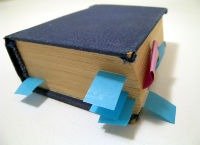|
ESL Writing StyleYour Personal "Voice"
One of the hardest problems an ESL writing student has is is developing and consistently using a writing style or "voice" that sounds natural and personal. The student may imitate a "textbook" as a good style model and end by being as uninteresting as most textbooks.

Using unfamiliar words produced by electronic translators or found in cross-language dictionaries and copying easily misunderstood idioms found in phrase books can often give the wrong impression. For many, just the limited amount of variety in their English reading experience can be a handicap. There can be many difficulties in learning to write well in a new language but with a desire to communicate well, it can be done. Joseph Conrad was one of the greatest 20th Century writers in English and is one of my favorites. He was born in the Ukraine in a Polish speaking family, learned French as a second language and learned English as an adult. Despite having a strong Polish accent all his life, his writing in English is known for his clear and personal style.
Develop Your Own StyleThe central idea of writing is to communicate clearly and effectively. The best advice for doing this is to sound like yourself. Make your writing personal and write the way you talk. Of course, writing should be a little more formal but it should still "sound" like you talking. Just a little less casually than you do with your friends. Using "wanna" and "gonna" instead of "want to" and "going to" are OK if you are writing dialogue in a story but not at other times. Finally, learn to use the tools and resources available here, at your library, and on your own writing desk to develop your own ESL writing style.
Writing Resources
|





 Get practical, useful information for students of writing and
Get practical, useful information for students of writing and